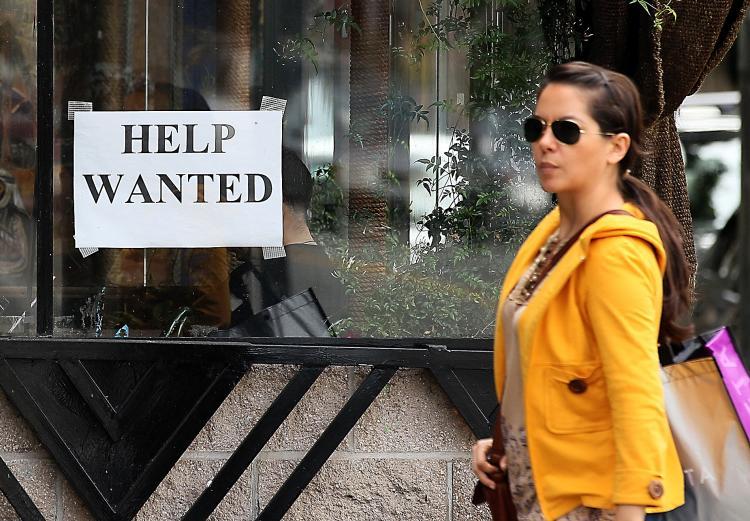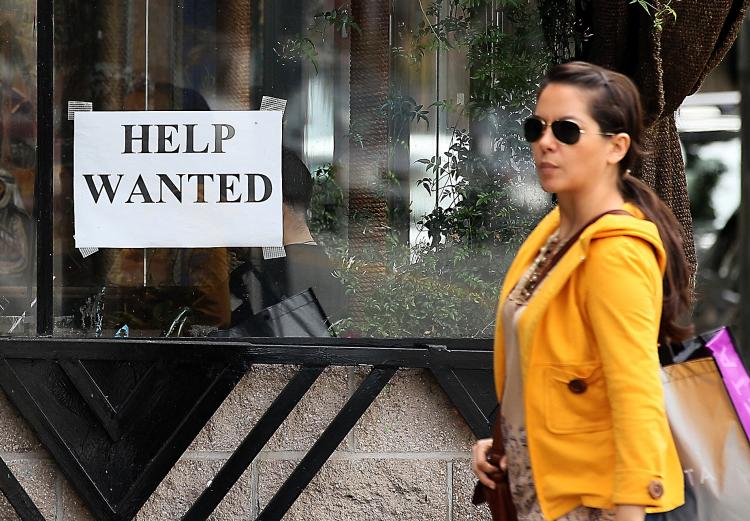NEW YORK—Stocks ended Wednesday modestly higher on Wall Street, as U.S. banking giant JPMorgan Chase & Co. unveiled higher quarterly earnings, and several positive economic reports also drove shares higher.
The Dow Jones Industrial Average ended the day 12,271, rising by 7.4 points, while the Nasdaq Composite Index gained 16.7 points to 2,761. The S&P 500 remained relatively flat, rising 0.02 percent.
JPMorgan became the first major bank to report first-quarter earnings, and it didn’t disappoint. The bank’s bottom line, which was 67 percent higher compared to the same period last year, came in at $5.6 billion, or $1.28 per common share. Topline revenue was lower, at $25.2 billion last quarter, compared to $27.7 billion.
The New York-based bank said that the higher income was due to investment banking fees and lower credit card losses for the period, however, its write-downs related to commercial and residential real estate continued to swell.
“These results partially benefited from improved credit trends in our credit card and wholesale businesses,” CEO Jamie Dimon said in a statement. Commenting on real estate-related losses, Dimon said, “Unfortunately, those losses will continue for a while.”
Bank of America Corp. will report earnings Friday.
Job Openings Balloon
The U.S. Department of Labor said this week that February’s job openings around the United States increased by 352,000 to 3.09 million, gaining by the most since December 2004.
The Labor Department also said that hirings increased in March.
Last month, the U.S. unemployment rate dipped below 9 percent. While economists agree that jobs for professionals and skilled labor are available, job openings for unskilled laborers are still lagging.
Retail Sales Rise
March retail sales rose 0.4 percent, according to government data released on Wednesday. The rise was mainly driven by gasoline purchases and sales in home furnishings.
Sales rose for the ninth consecutive month in March, at a rate of seasonally adjusted $396 billion.
However, most of the sales were driven by gasoline, which has risen in recent weeks due to skyrocketing oil prices—crude oil futures have consistently settled around $110 in recent weeks due to demand from emerging markets and continued unrest in the Middle East, a main oil-producing region.
Excluding gasoline sales, retail sales gained 0.1 percent. “Consumers can’t absorb the spike in energy prices without cutting back in other areas,” Steven Ricchiuto, chief economist at Mizuho Securities USA, said in a MarketWatch interview.
How Much Higher Will Oil Go?
But some experts say that the rise of gas prices may not continue much longer. Investment bank Goldman Sachs Group Inc. this week released a research note with a bearish tone on crude oil—predicting a “correction” in Brent crude, by more than $10 per barrel.
Goldman, which predicted $200 per barrel a few years ago, is now advising clients to take their gains in oil and some other commodities such as copper.
“Copper and platinum will face near-term headwinds as higher oil prices potentially translate into a negative demand shock for the metals and as these commodities are exposed to supply chain problems resulting from the earthquakes in Japan,” Goldman Sachs research analysts wrote.
The Dow Jones Industrial Average ended the day 12,271, rising by 7.4 points, while the Nasdaq Composite Index gained 16.7 points to 2,761. The S&P 500 remained relatively flat, rising 0.02 percent.
JPMorgan became the first major bank to report first-quarter earnings, and it didn’t disappoint. The bank’s bottom line, which was 67 percent higher compared to the same period last year, came in at $5.6 billion, or $1.28 per common share. Topline revenue was lower, at $25.2 billion last quarter, compared to $27.7 billion.
The New York-based bank said that the higher income was due to investment banking fees and lower credit card losses for the period, however, its write-downs related to commercial and residential real estate continued to swell.
“These results partially benefited from improved credit trends in our credit card and wholesale businesses,” CEO Jamie Dimon said in a statement. Commenting on real estate-related losses, Dimon said, “Unfortunately, those losses will continue for a while.”
Bank of America Corp. will report earnings Friday.
Job Openings Balloon
The U.S. Department of Labor said this week that February’s job openings around the United States increased by 352,000 to 3.09 million, gaining by the most since December 2004.The Labor Department also said that hirings increased in March.
Last month, the U.S. unemployment rate dipped below 9 percent. While economists agree that jobs for professionals and skilled labor are available, job openings for unskilled laborers are still lagging.
Retail Sales Rise
March retail sales rose 0.4 percent, according to government data released on Wednesday. The rise was mainly driven by gasoline purchases and sales in home furnishings.Sales rose for the ninth consecutive month in March, at a rate of seasonally adjusted $396 billion.
However, most of the sales were driven by gasoline, which has risen in recent weeks due to skyrocketing oil prices—crude oil futures have consistently settled around $110 in recent weeks due to demand from emerging markets and continued unrest in the Middle East, a main oil-producing region.
Excluding gasoline sales, retail sales gained 0.1 percent. “Consumers can’t absorb the spike in energy prices without cutting back in other areas,” Steven Ricchiuto, chief economist at Mizuho Securities USA, said in a MarketWatch interview.
How Much Higher Will Oil Go?
But some experts say that the rise of gas prices may not continue much longer. Investment bank Goldman Sachs Group Inc. this week released a research note with a bearish tone on crude oil—predicting a “correction” in Brent crude, by more than $10 per barrel.Goldman, which predicted $200 per barrel a few years ago, is now advising clients to take their gains in oil and some other commodities such as copper.
“Copper and platinum will face near-term headwinds as higher oil prices potentially translate into a negative demand shock for the metals and as these commodities are exposed to supply chain problems resulting from the earthquakes in Japan,” Goldman Sachs research analysts wrote.





